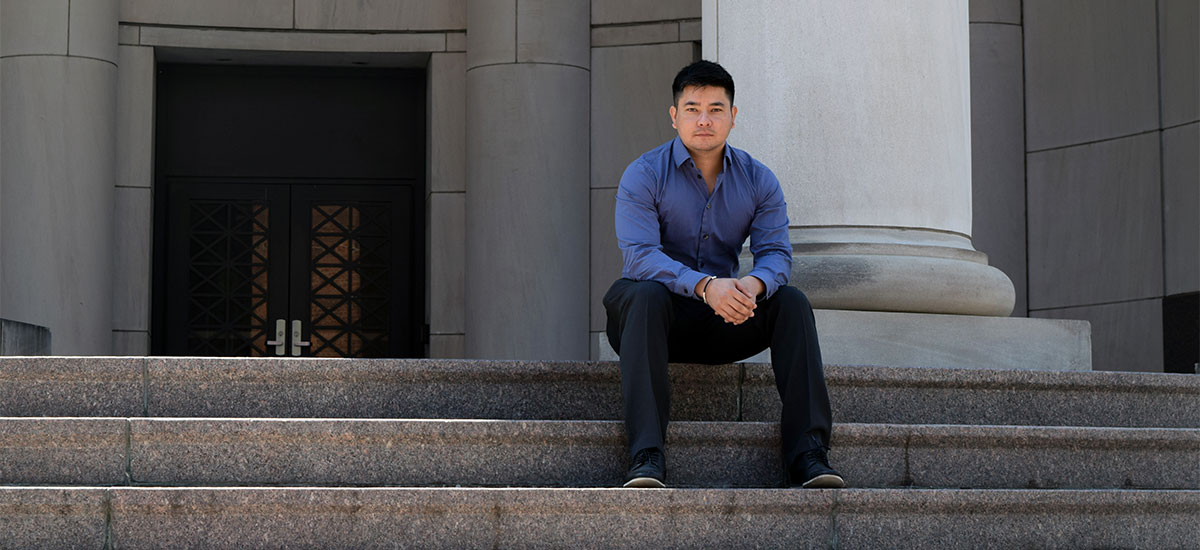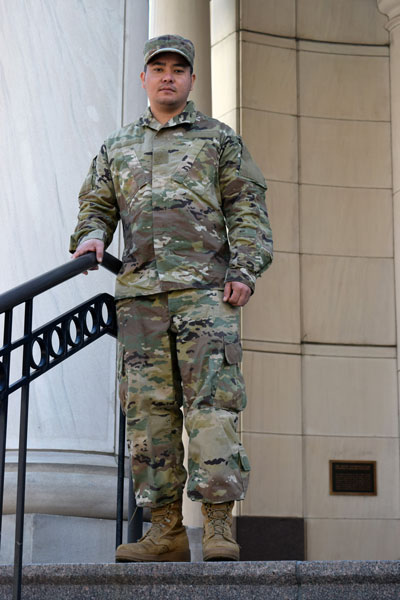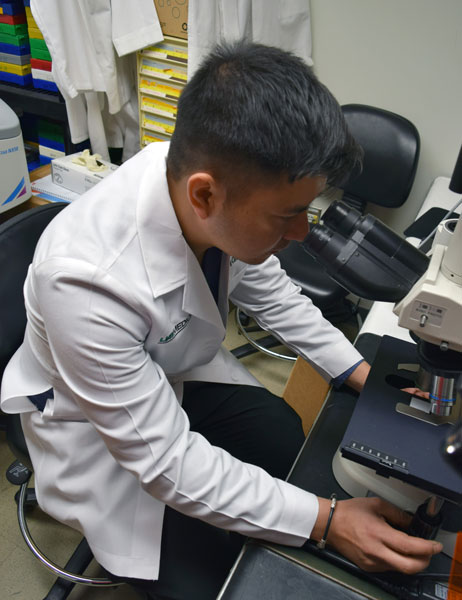As far back as Samir Rana can remember he had been told stories of his ancestors and their work with herbal medicine.
For Rana’s family, medicine was more than just a means to an end. It was in their blood. His father and aunt worked in public health, and one uncle was a nurse, while another was a doctor. It was believed that Rana would also follow in the family’s footsteps and pursue a medical degree.
“I was always interested in health, biology, science. I would watch more Discovery and National Geographic than cartoons while growing up, but I didn’t want to become a physician,” said the 30-year-old UAB postdoctoral fellow from Nepal. “I wanted to be a hero behind the scene of medicine, and research about the diseases that impact human health. That’s the journey that led me to this point in my life.”

Rana, the student
Rana came to the United States when he was 19 to pursue a bachelor’s degree in biochemistry from Louisiana State University. His dream was to become a biomedical scientist so one of his LSU professors recommended UAB for his doctoral degree. After doing some research, Rana decided it would be a good fit for his career.
“When I started graduate school, everyone was so warm and welcoming,” he said. “There was such a collaborative environment here. You could knock on a complete stranger’s door and ask for help and they would help you. And the research is great. Anything you are interested in, you will find someone here that is doing research on it.”
Rana, however, did not have a clue what he wanted to research. He knew he was interested in diseases, but he didn’t know anything beyond that. So, he started his rotations and began gaining experience and learning more about the different labs and research.
He did work with immunology, bone biology and cancer biology, but nothing really stuck — until his fourth lab rotation. The research was in neurobehavioral- and cardiovascular- biology and investigated the link between brain/behavior and heart/cardiovascular parameters.
“The lab looked at depression and anxiety in animal models,” Rana said. “It was fascinating how you could research the animal models and translate that to humans. I knew you could translate molecular biology, but I didn’t realize behavior was also translatable.”
Research had shown when a child experiences early life stresses, like poverty, parental neglect and physical and sexual abuse, then he or she would have higher chances of suffering from mental and/or physical health problems later in life, Rana said.
His doctoral research looked at how those early life stresses impacted individuals as an adult in three key areas — behavior, brain function and cardiovascular function.
Rana finished his Ph.D. and graduated in 2016. Next step — a job that would continue pushing him toward his career objective, or so he thought.
Rana, the soldier

While finishing up his doctoral degree, Rana tried to find a job, but soon realized that as an international student in the United States on an F-1 student visa, his choices were limited. He was almost to the end of his options when he learned about a program through the United States Army called military Accessions Vital to the National Interest.
“The military was recruiting individuals from various cultural and language backgrounds and, in return for your service, you would be granted citizenship,” Rana said. “Nepalese, which was my mother tongue, was included on the list. I wasn’t sure if this was the path for me, but then I thought about the benefits. When you have citizenship, there is more opportunity for career and professional development, and it’s a respectful way to get your citizenship, so I jumped in.”
Rana signed the contract to become a soldier in the U.S. Army Reserve in September 2015 and left for Basic Training in March the following year. While he knew basic training would be physically challenging, he wasn’t prepared for the mental challenges associated.
“I was a free man working on my Ph.D. and then I’m at the training, stuck in a room with 50 different individuals,” he said. “You have to obey all orders and have no control over basically anything — you’re told when to wake up, sleep, eat. There’s no leisure, no relaxing.”
The program through which he joined did not offer the full comprehensive list of all the jobs; he had to choose from certain designated jobs. While there were a handful of job choices, it was not quite as simple as that. Certain jobs are connected to units, so Rana had to find a unit that was close to Birmingham with availability. Fortunately, there was an Army Reserve unit that was close by with an open position for a plumber. The decision was made.
Rana, the trainee and the soldier
Once settled into the life of an Army Reserve solider and finally granted U.S. citizenship, Rana started thinking about the next step toward his career goal.
He had been studying the link between brain and cardiovascular functions while working on his Ph.D. and had hoped to find a postdoctoral fellowship in that same area, but no luck. Rana reached out to a former faculty member, who is now his current mentor, and asked about lab openings in cardiovascular science. He applied for a T-32 training grant in basic and translational science in heart failure and was accepted. Rana started the postdoc in July 2017.

Rana will be with the postdoc program for at least two years, possibly three. At the same time, he must balance his life as a researcher with his life as a soldier, which can be quite challenging at times.
As a solider with the U.S. Army Reserve, Rana must complete a monthly drill, which typically falls on a weekend. In addition, he has a three-week annual training every summer. The location varies from years to year. In 2017, he was in Europe for a mission.
“My mentors are incredibly supportive of my work with the Army,” he said. “But it’s still hard planning around my life in the lab and my life with the Army Reserve. Being a soldier is a big commitment. Balancing the two is incredibly difficult.”
But the skills that Rana has gained as a soldier has helped him immensely in other areas of his life. Apart from the technical skills that his job requires, it has also enhanced his soft skills, such as team building, communication, leadership and time management, which he applies to his life in general, possibly improving his prospects in the job market.
“It’s more than just the skills I’ve gained during my time with the U.S. Army Reserve,” Rana said. “I have made friends and I’ve gotten to visit places that I probably wouldn’t have before. It’s been a good experience.”
Rana will spend another almost four years with the Army Reserve. At that point, he will be finished with his postdoc and hopes to have received a professorship. However, he is also researching other job possibilities as an alternative, just in case his first choice doesn’t pan out.
“I don’t want to be a long-term postdoc,” he said. “I want to have my own lab and research what I want to research.”
Whatever happens, Rana still plans on pursuing biomedical research.
“There are so many unknowns when you look at cardiovascular, but I’m also interested in neurobiology,” he said. “If I have the resources and funding, I would love to investigate the link between the two. Cardiovascular disease is the No. 1 killer, and looking at the brain and behavior is just really interesting and exciting. It would be great if I could spend my life researching the two things I find most interesting.”